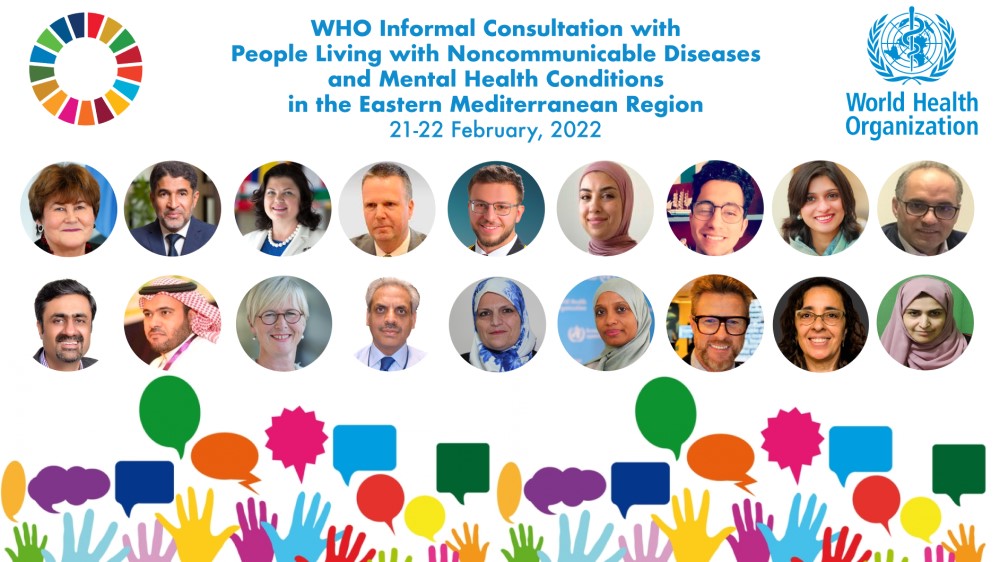
The World Health Organization (WHO) Regional Office for the Eastern Mediterranean organized a virtual informal consultation with people living with noncommunicable diseases and mental health conditions in the Region in coordination with the WHO Global Coordination Mechanism on the Prevention and Control of Noncommunicable Diseases. The consultation aimed at exploring next steps and developing a framework for meaningful engagement with people with lived experiences to support in addressing the burden of noncommunicable diseases and mental health conditions.
Worldwide, there has been a transition in the burden of disease from communicable to noncommunicable diseases due to epidemiological shifts occurring in the last few decades. Concurrently, mental health problems are among the top ten leading causes of disease burden and are the single largest contributor to years lived with disability.
At a regional level, several countries face the double burden of communicable and noncommunicable diseases which is likely to affect health systems in lower-income countries, where more than 150 million people are living with noncommunicable diseases. The COVID-19 pandemic has further increased these existing inequalities, imposed several challenges to the delivery of services and highlighted the importance of active engagement in designing and implementing policies, programmes, and services by communities, civil society, and individuals with lived experiences to ensure a patient-centered, rights-based and inclusive response, not only in our Region but globally as well.
Therefore, and as part of WHO’s commitment to achieving Sustainable Development Goal 3 Target 3.4 to reduce by one-third premature deaths from noncommunicable diseases and promote mental health by 2030, six regional consultations are taking place between January and May 2022 to support the co-creation and contextualization of a WHO framework for meaningful engagement with people living with noncommunicable diseases and mental health conditions, which is expected to be published in late 2022. The regional consultation for the Eastern Mediterranean was held over two days, from 21 to 22 February 2022, where the first day tackled noncommunicable diseases, while the second day focused on mental health conditions.
The consultation included a combination of presentations, sessions and breakout discussions which built on the recent WHO informal consultations for people living with noncommunicable diseases and diabetes held in 2021. Dr Zsuzsanna Jakab, Deputy Director-General, WHO headquarters and Dr Ahmed Al-Mandhari, WHO Regional Director for the Eastern Mediterranean inaugurated the opening sessions on both days. Dr Jakab stressed the importance of community participation and referred to it as “the guiding principle for strengthening healthcare systems especially at the primary health care level”. Dr Al-Mandhari focused on the special importance WHO is giving to “the voices, expertise and inputs of people with lived experiences” and reaffirmed the Organization’s commitment “to supporting meaningful engagement with people living with noncommunicable diseases and mental health conditions”.
Over the two-day period, 188 participants attended the consultation from 28 countries including more than 50 representatives from various nongovernmental organizations and civil society organizations operating across the Region and beyond, namely from Bahrain, Denmark, Egypt, Jordan, Lebanon, Morocco, Pakistan, Palestine, Qatar, Sudan, Saudi Arabia, Tunisia, United Arab Emirates and United Kingdom.
People living with noncommunicable diseases and mental health conditions co-chaired and facilitated the sessions, with support from facilitators from the WHO regional office and headquarters. WHO country offices were represented by technical teams, and government representatives actively participated from countries in the Region. Several participants reflected on their own lived experiences, challenges and successes. This demonstrated the importance of engaging with people living with noncommunicable diseases and mental health conditions to improve health and well-being for them and people in general.
Ms Amira Aly El Gamal, President, Our Step Association, Jordan
Ms Cyrine Farhat, Founder, Positive on Glucose, Lebanon
Mohammed Seyam, International Diabetes Federation, Young Leader in Diabetes, Palestine
In her closing remarks, Dr Devora Kestel, Director, Department of Mental Health, and Substance Use, WHO headquarters highlighted that “the active participation of people with lived experiences helps to create policy, service and systems reforms that are truly responsive to their needs.”
Following these regional consultations, WHO will explore next steps on how to meaningfully engage people with lived experiences further in the regions and support the co-development of a WHO framework on the matter. This framework is expected to establish and fill the gap for the evidence base for meaningful engagement and provide the opportunity for further knowledge collaboration to support this area within the noncommunicable diseases and mental health agendas for WHO, countries and other key stakeholders at regional and national levels.
Related links
Global Coordination Mechanism on the Prevention and Control of Noncommunicable Diseases


